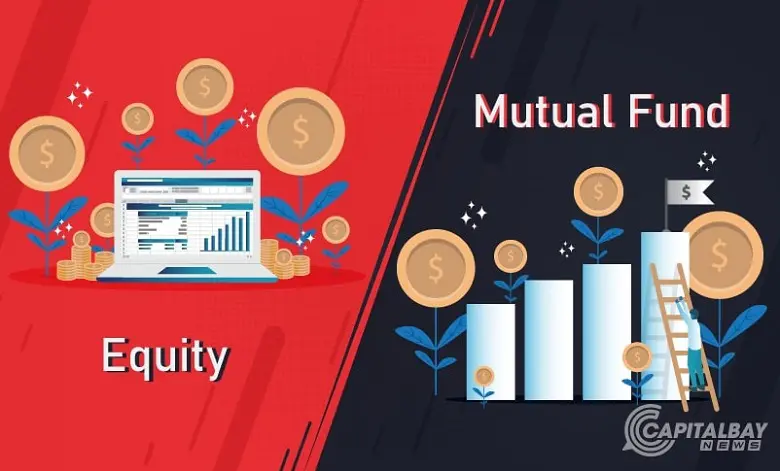Equity vs Mutual Fund: A Comprehensive Study

Investing your money in financial portfolios earns you returns, provided you are investing it in the right plan. Also, the duration of having your money invested matters along with the type of risk you are willing to take. Based on the risk factors, there are two types of popular investment options: equities and mutual funds.
Mutual funds typically are a diversified portfolio that includes bonds, stocks, money market instruments, and other stocks. On the other hand, equity is a company’s stake or shares owned by an investor or shareholder. With equity, the shareholder earns returns upon the liquidation of the company’s assets.
Both equity and mutual funds are long-term investments with their own sets of risks and advantages. Hence, it is very crucial to understand the difference between a mutual fund and equity. And, even more so, to determine the best investment plan depending on the investor’s risk profile. But before that, let’s understand what mutual funds and equity are.
What are Mutual Funds?
Mutual funds are professionally managed investment funds. The fund or portfolio manager manages the investors’ funds for a fee and uses these funds for purchasing securities for returns. Some of the benefits are diversification of one’s financial portfolio, liquidity, professional management, among others.
Typically, mutual funds could be open-end funds, closed-end funds, unit investments trust, and ETFs or Exchange Traded Funds. They are broadly classified as stock, equity funds, hybrid funds, fixed income funds or bonds, and money market funds, etc. Index funds, actively managed funds, etc., are also categories of mutual funds.
What is Equity?
The term ‘equity’ in finance refers to the ownership of assets that may or may not have debt or other liabilities. When you invest in equity, it means you buy the company’s stocks directly from the company or via other investors owning the stocks. The objective is to earn returns through dividends or capital gain (selling stocks).
When an investor has more than 62% of the company’s stocks, he/she can influence the management decisions of the company like voting on electing the board of directors.
Equity Stocks vs Private Equity
Unlike equity stocks, private equity is a type of investment fund, and is not publicly traded. It is a type of asset class involving equity securities limited to company partnerships.

Key Differences Between Equity and Mutual Fund
Apart from the risk profile, equity and mutual funds also differ in terms of financial interest, asset allocation, trading the assets or shares, etc. Nevertheless, equity funds are believed to be a type of mutual fund as investors hold shares in a company, granting them a kind of ownership on the company’s funds. Here, returns are earned via dividends based on the company’s performance. But there are major differences as well. Understanding these differences is very important for the investor’s asset allocation, which are as follows:
Investment Style
In the case of mutual funds, the investor’s money is invested in government and corporate bonds, highly-rated assets, non-convertible debentures, among others. Typically, mutual funds are actively managed by a fund manager or professional money managing company. The fund manager or company may charge annual fees and commission that is deducted from the investors’ funds.
In the case of equity, the investor’s money is invested in equity-linked assets. When more than 65% of the investor’s money is invested in stocks reflecting in their financial portfolio, it is referred to as ‘equity mutual funds’.
Risk Factor
Generally, a mutual fund is believed to be ideal for individuals with a low-risk profile. It is also suitable for investors looking for a comparatively low risk, long-term investment opportunity. On the contrary, compared to mutual funds, equity and equity funds are riskier.
As a matter of fact, the changing share prices in equity funds will directly affect the NAV or Net Asset Value of the equity fund. Moreover, the price of stocks in an equity fund is subject to currency volatility, inflation, tax rates, etc.
Some of the best equity fund policies invest the investors’ funds in a myriad of industries for portfolio diversification. Mutual funds however are also subject to risks as the bonds invested in are prone to changes in interest rates. And, thus, the funds invested in assets and bonds are susceptible to fluctuations in their NAV.
The bottom line is although mutual funds are not risk-free, they have a low-risk quotient when compared to equity.
Capital Gains or Returns
Generally, equity mutual funds provide high returns. Nevertheless, equity mutual fund is highly volatile, meaning they are equally prone to losses. Returns and capital gains in this case are subject to the financial markets. On the other hand, mutual funds when broadly diversified, can balance the losses and in turn increase the gains. However, mutual funds provide a fairly decent ROI over a long period when compared to equity stocks that provide high ROIs in a comparatively short time.
Tax Liabilities
Tax liabilities on mutual funds vary and depend on the type of mutual fund and the duration of the investment. Equity stocks, or individual stocks that are longer investments (more than 12-months) are tax exempt on the capital gains earned. In the case of short-term equity funds, capital gains are subject to a 15% tax.
Long-term debt funds are also prone to a 20% tax, which is adjusted for inflation with indexation. In the case of short-term mutual funds, the capital gain is included in the investor’s income and taxed accordingly.
Asset Volatility
Individual stocks or equity stocks are highly volatile when compared to mutual funds. Although high volatility indicates greater profits, the opposite is also true. That is to say, the value of individual stocks may go up or down in a short period with equal chances of profits and loss.
Owning to the diversification of the portfolio, mutual funds are comparatively more stable as both profits and losses are balanced over a broad spectrum of assets.
Managing the Investment Fund
Mutual funds are typically managed by fund managers. Thus, mutual funding is a convenient mode of investment where the fund managers ensure gains on your investment. Equity stocks or individual stocks as the name suggests they are managed by individual investors. Equity funds management requires investors to have sound market knowledge for earning better gains. As actively managed funds involving a third-party, mutual funds are far more convenient than individual funds.

Costs Involved
Trading costs of equity funds are typically very high. Moreover, equity funds are suitable for investors with high risk appetites. Comparatively, costs involved trading mutual funds are much lower. Moreover, mutual funds are widely diversified and the expenses involved are balanced adequately.
To summarize, both mutual fund schemes and equity have their own set of advantages and drawbacks in terms of risks, returns, tax liabilities, etc. The decision to invest in either must thus solely depend on the investor’s expertise in the financial market, risk appetite, and long-term or short-term goals. Most importantly, thorough research is vital to choose the best investment plan.
Benefits of Investing in Equity Mutual Fund
- An equity mutual fund is an ideal investment plan for small investors as they require a small investment capital and it is a low risk investment opportunity.
- Although a high risk investment option, equities offer one of the largest ROIs. Nevertheless, the trade charges are often deducted from the gains, which is very high.
Benefits of Investing in a Mutual Fund
- Owning to diversification, mutual fund investors can benefit from equity investment via mutual funds.
- While not completely risk-free, compared to equities, managing risks is quite convenient with mutual fund investment.
- Financial managers handle the investor’s portfolio and thus require little or no input from the mutual fund investors in terms of market research.
- Trading mutual funds are competitively cheaper when compared to trading equities.
- There are many different ways of acquiring mutual funds. In fact, one can buy them via banks, investment companies, credit unions, etc.
- Mutual funds when compared to equities are easy to sell.
Disadvantages of Equity Funds
- Investors gain returns only when the company generates profits
- There is no guarantee of gaining returns
- Buying and selling equities is difficult
- The trading cost of an equity fund is much higher (and thus low gains)
Disadvantages of Mutual Funds
- They are susceptible to market changes
Equity fund and mutual fund are different yet similar because the former is a type of mutual fund investment opportunity. On the whole, investing in mutual funds is an ideal opportunity for investors to generate gains over a stipulated period. Whether stocks or bonds or retirement plans, the options are many. Moreover, the investors need not actively manage the fund as they are invested by fund managers via systematic investment plans or SIP. Nevertheless, choosing the right type of mutual fund like stocks, bonds, etc. is very important. Below are some important points to consider to determine the ideal mutual fund that best suits your requirements.
Determine your goals and risk tolerance
Set your priorities by finalizing the investment time frame. List the perks and drawbacks of both long and short-term plans. Make sure the time duration complies with your end goals.
Understanding your risk tolerance is very important. For instance, determine if you are comfortable with a portfolio, which is highly volatile; or whether a more stable investment strategy is your cup of tea.
Readers are advised to note that investing in mutual funds incur service charges. Compared to short-term plans, a long-term investment plan of more than a year can offset the expenses incurred.
Choosing the right mutual fund management firm
Track the profits and losses record of an investment firm you are likely to opt for. Gaining this information is easier by visiting the social media pages of the company. You may also refer to the user testimonials and forums to get accurate information on the company. Avoid firms that have experienced massive losses. Research is key to avoid losses and to ensure high gains on the money you have invested in. Make sure to seek referrals from the company to gauge their transparency. Choosing the right firm is the most important primary step.

Watch Out for Service Charges and Other Expenses
Does your mutual fund have a sales load? Make sure to opt for investments with no sales load. So, what is a sales load? It is the fee the investors pays the firm for selling the fund. Most often companies charge 5% of the total assets. Making sure to buy funds with additional expenses. Some funds charge flat service charges independent of the total assets in the investor’s portfolio. As a matter of fact, well-established financial firms invest the funds in assets lacking such hidden charges.
Whether mutual funds or equities, they are ideal investment opportunities for gaining high returns on investment. However, the key is to access one’s risk appetite and choose an ideal type of plan.
Conclusion
Whether long or short term investments, numerous factors come into the picture: risks involved, capital size, nature of investments. Understanding these aspects is very important and is the primary step of investing your money.
No investor is alike and thus understanding the best ways of investing in areas one is comfortable with is also very important. Both mutual funds and equities are subject to market risks. However, determining which is less risky or volatile based on the extent of risk you are willing to take is imperative.
In this article, we have highlighted the difference, advantages, and disadvantages of equity funds and mutual funds. While both have their own set of benefits, an investor’s risk appetite must also be considered before choosing the right scheme. As a matter of fact, it always narrows down to the level of risk the investor is prepared to indulge in considering the returns one may gain in the long run.



